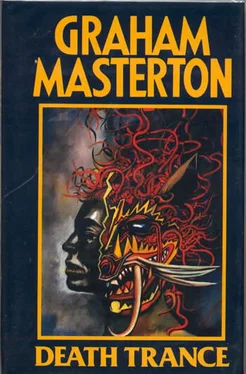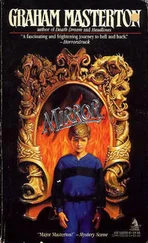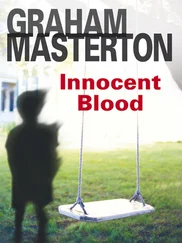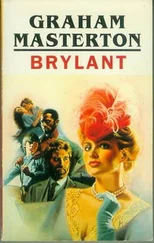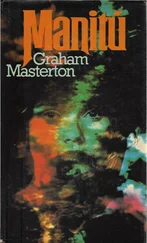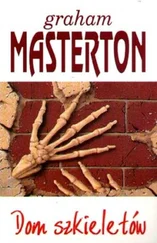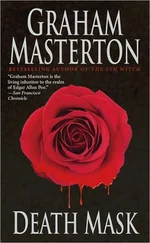'Do you think that's wise?'
'Not particularly. But we're not discussing wisdom here, Walter. We're discussing whether you and I want our dead wives back or not. I'm not saying there isn't a price. It's conceivable that other people may be put at risk, although I doubt if there'll be any less risk if the demon is kept in captivity than if we set it free. Both of us have to face up to what we have here: an ancient and incomprehensible influence that controls the very process of death itself. The lord of the region of the dead, that's what they call it. And one way or another, it's going to re-establish its reign, whether we like it or not. If we leave it under the ocean, the copper vessel will eventually corrode to the point where Mictantecutli will be able to escape of its own accord; if we bring it up and keep it at the Peabody, or send it off to old man Evelith, who knows how long they'll be able to keep it under control? Even David Dark couldn't, and he was the man who first brought it here. So, from every angle, it looks like a no-win situation — in which case I'm suggesting that at least we rescue Jane and Constance.'
I was glad I wasn't somebody else, listening to myself presenting this argument. It was flawed in logic, flawed in fact, and most of all it was flawed in fundamental morality. I didn't know anything about old man Evelith's ability to control Mictantecutli : according to Anne, he already had some kind of plan worked out, a plan involving Quamus and Enid and the rest of the Salem witch-coven. Neither did I know for sure if Mictantecutli 's copper vessel was corroding or not. Worst of all, I didn't know what hideous influence Mictantecutli would be able to exert over both the living and the dead once Walter and I had set it free.
I thought of David Dark , literally exploding as he walked towards his house. I thought of Charlie Manzi, and the crushing, grinding noise of those tombstones. I thought of Mrs Edgar Simons, screaming for help. I thought, too, of Jane: smiling and seductive, a solid form without any reality, a dead wife who walked. All of these images tumbled over in my mind in a confusion of fear, disbelief, depression, nightmare, and unrealized terror. But there was one hope to which I was clinging with fierce and illogical tenacity; one hope which enabled me to disregard the naked fear of Mictantecutli 's walking dead, the pariah's children; and the extreme danger of releasing an ancient demon into a modern world. That hope was the hope of seeing Jane alive again, of being able to hold her again, against all the dictates of fate and human destiny, against all accepted logic. It was the one hope which Mictantecutli knew that I could never deny, no matter what the threatened consequences might be; and that was what made Mictantecutli a demon.
Walter said, 'I'm not at all sure how I could present this as an investment portfolio.'
'It won't be all that difficult,' I told him. 'Show your clients pictures of the Wasa, and the Mary Rose. Tell them how much prestige is going to be involved. And then explain how the salvaged ship is going to be displayed to the public, possibly as the central attraction in a recreational theme park. Come on, Walter, five or six million dollars isn't asking for the earth. A cheap movie costs five or six million dollars.'
'My clients don't invest in cheap movies,' said Walter.
'Listen,' I said, earnestly, 'do you want Constance back again or don't you?'
The waitress brought him his steak-and-oyster pie. He prodded it with his fork like a man who has suddenly lost his appetite. 'You can go back to the salad bar if you want to,' the waitress told him. 'There's no extra charge.'
'Thank you,' he said, and then looked across the table with a haunted, tired expression. 'Supposing nothing comes of this?' he asked me. 'Supposing it's all a dream, all an illusion? I'll have lost my career, as well as Constance.'
'Supposing you never try?' I retorted. 'What will you think then, for the rest of your life? "I could have had Constance back, but I was too frightened to make the effort." '
Walter cut into his pie-crust, and a curl of fragrant steam rose out of it. He ate slowly, and without much obvious relish; but all the same he was still hungry enough to finish most of the pie, and his bread as well. He drained the last of his Guinness, and then drummed his fingers sharply on the deal tabletop.
'Five or six million, is that it?'
'That's the estimate.'
'Can you get me an accurate costing?'
'Of course.'
He wiped his mouth with his napkin. 'I don't know what I'm letting myself in for,' he said. 'But the least I can do is run it up the flag-pole and see if anybody salutes it.'
'Think of Constance,' I reminded him.
'I am,' he said. 'That's what worries me.'
Dr Rosen was just parking his Mercedes 350 SL outside of the Derby Clinic when I drew up beside him in my rattling Toronado and gave him a wave of greeting. He stopped on the sidewalk, a neat, immaculately-dressed man with a goatee beard and large California-style spectacles with his initials engraved on the lower left-hand corner of the left lens. I often used to think that he would have been happier in Hollywood than he was in Salem: he had a naturally exhibitionistic nature and a love of medical jargon that ranged from 'sibling shock' to 'acceptory neurosis' and back again.
He was very professional, however: thorough and knowledgeable and careful in the finest tradition of New England's country physicians, and his love affair with medical ritz couldn't really be held against him.
'Good morning, John,' he said, cheerfully. 'Come on in and have some coffee.'
'I just came to see Anne,' I told him. We walked together up the sun-flecked pathway to the clinic's glass-fronted reception area. Inside, it was calm and air-conditioned, with smooth background music and expensive potted plants, and a discreet waterfall which tinkled into a free-form goldfish pool. Seated at a desk at the far side of the reception area was a stunningly pretty blonde nurse with a white uniform and a white cap and spotless white medical shoes. She probably didn't know the difference between a cyst and a cistern, but who cared. She was all part of Dr Rosen's 'convivial clinic' theme.
'Any calls, Margot?' Dr Rosen asked her, as he passed her by.
'Mr Willys, that's all,' said Margot, flashing sooty black eyelashes at me. 'Oh, and Dr Kaufman from Beth Israel.'
'Call Kaufman back for me in ten minutes, will you?' asked Dr Rosen. 'Leave Willys until he calls back himself. Was it his fibrositis?'
'I guess.'
'Come in, John,' Dr Rosen beckoned me. 'And, thanks, Margot.'
'You're welcome,' purred Margot.
'She's new,' I commented to Dr Rosen, walking into his large cream-painted office, and looking around. He still had the large Andrew Stevovich oil painting on the wall, a moon-faced woman and two moon-faced men, a picture which I knew in every detail, every shade, every angle, because I had sat opposite it for hours on end, talking to Dr Rosen about my depression and my bereavement.
Dr Rosen sat down at his wide teak desk and sorted briefly through his mail. The desk was bare except for the morning's post and a small bronze abstract sculpture in a twisted triangle, which Dr Rosen had once told me was meant to represent the self-curative strength inherent in every human. It always looked more like a serious case of indigestion to me, but I had never said so.
'Anne,' he said, as if he were continuing a sentence which he had left half-finished, 'Anne is suffering from a broken wrist, severe bruising, muscular strain, swollen tendons, and shock. Well, I imagine the shock has probably subsided by now, but the physical damage will take a few days to right itself.'
Читать дальше
